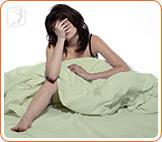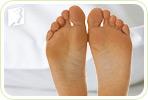
Menopausal night sweats can be extremely uncomfortable. Many women report waking in the night feeling clammy, uncomfortable, and sweaty when they are experiencing night sweats. However, there are many different treatments for menopausal symptoms available to women. Lifestyle changes, natural supplements, and hormone replacement therapy, are all good approaches for treating menopausal night sweats. Continue reading to learn more about the treatment options available to sufferers of night sweats.
Lifestyle Changes
Lifestyle changes, in conjunction with other treatments, are the easiest, yet most effective way to treat menopausal night sweats. Eating a healthy diet, exercising regularly, and avoiding spicy food before sleeping are all recommended for managing this symptom.
Women can also try wearing lighter fabrics when sleeping. Moisture-wicking pajamas transfer excess sweat away from the surface of the skin and will prevent a woman from becoming overly hot or cold during sleep. They are also more hygienic than regular pajamas, because they prevent bacterial overgrowth, and dry faster. Wearing breathable clothing may be an easy solution for night sweats and produce advantageous results for many women.
Natural Supplements

Natural supplements can effectively combat night sweats alongside other lifestyle adjustments. Natural supplements are often safer than HRT because they don't replace chemicals in the body. Nevertheless, phytoestrogenic herbs such as black cohosh have both benefits and disadvantages. For example, because they act in a similar way to estrogen they can encourage the body to stop producing its own hormones. However, hormone-regulating supplements do not replace hormones in the body, but rather stimulate the body to create its own. As a result, these supplements can be extremely useful alongside lifestyle and dietary changes.
Hormone Replacement Therapy
Pharmaceutical companies often advise women to use hormone replacement therapy (HRT), because medications are often the fastest and strongest treatments for night sweats. However, since these treatments have been linked to possible health risks, there are other options women should explore before they consider HRT. Hormone Replacement Therapy has been shown to prevent diseases such as osteoporosis, but it has also been linked with an increased risk of developing breast cancer, stroke, and heart disease. Therefore, menopausal women should discuss all of their options with their doctor before they start any treatment.
More Information
For those who require more information on treatments for night sweats, follow the link below.
Sources
- Boston Women's Health Collective. "Hot Flashes, Night Sweats and Sleep Disturbances." Our Bodies, Ourselves. 2006.
- The National Institute of Health. (n.d)."Signs of the Menopausal Transition." Retrieved from www.nih.gov.
- Von Muhlen, DG, et al. "A community-based study of menopause symptoms and estrogen replacement in older women." Maturitas. Sept 1995; 22(2): 71-8.


